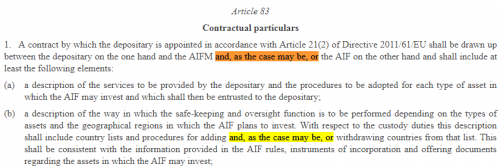And/or: Difference between revisions
Amwelladmin (talk | contribs) No edit summary |
Amwelladmin (talk | contribs) No edit summary |
||
| (21 intermediate revisions by the same user not shown) | |||
| Line 1: | Line 1: | ||
{{a|plainenglish|[[File:Andor.png|thumb|center|500px|for extra cosmological points, try the preferred EU formulation.]]}}{{f|And/or}} is the [[legal eagle]]’s equivalent of a damp kipper handshake. Avoid it. There is no more obvious sign that a text is in need of a [[plain English]] reaming. | |||
“{{f|And/or}}” ''means'' “{{f|or}}”, because “{{f|or}}” ''includes'' “{{f|and}}”. | |||
That’s it. | |||
And/or is | ===In [[tedious]] detail=== | ||
“{{f|And/or}}” has a face only a mother could love. It is borne of the [[fear]] that, when considering alternatives ''any'' of which leads to a given outcome, things might somehow be different if they ''all'' occur. | |||
In | There is no grounds for this fear. Logically, this is how one defines {{f|and}} and {{f|or}}: | ||
:{{and}} | |||
:{{or}} | |||
===The and/or paradox=== | |||
Besides, [[and/or]] is not just ugly; it’s circular. It presents as a [[paradox]], because of that [[slash]]. Now the slash is not a part of idiomatic punctuation in the English language. It’s a decoration with no fixed grammatical meaning. To use a [[slash]] in legal writing is to confess that the ordinary, punctuated words of the English language have defeated you. | |||
In “[[and/or]]”, that slash means — can ''only'' mean — “''{{f|or}}''”. So by saying “{{f|and/or}}” you are really saying “and, ''or'' or”. But to be hermetically sealed and consistent, shouldn’t you make one further clarifying step, and say “{{f|and}}, {{f|and/or}} {{f|or}}”? | |||
AND DO YOU NOW SEE THE INFINITE REGRESSION YOU HAVE SET IN MOTION? | AND DO YOU NOW SEE THE INFINITE REGRESSION YOU HAVE SET IN MOTION? | ||
Go back to your draft and strike all examples, and we shall never speak of this again. | Go back to your draft and strike all examples, and we shall never speak of this again. | ||
{{ | ===Classic and/or fails=== | ||
Spotted in, where else?, an [[NDA]]: | |||
{{quote|Disclosing Party may demand the return, and/or destruction and/or erasure of Confidential Information at any time.}} | |||
You can’t have it both ways: You can’t return it ''and'' destroy it. | |||
{{sa}} | |||
*[[profound ontological uncertainty]] | |||
{{c3|conjunction|Plain English|ISIA}} | |||
{{c|Paradox}} | |||
Latest revision as of 13:30, 14 August 2024
|
Towards more picturesque speech™

|
And/or is the legal eagle’s equivalent of a damp kipper handshake. Avoid it. There is no more obvious sign that a text is in need of a plain English reaming.
“And/or” means “or”, because “or” includes “and”.
That’s it.
In tedious detail
“And/or” has a face only a mother could love. It is borne of the fear that, when considering alternatives any of which leads to a given outcome, things might somehow be different if they all occur.
There is no grounds for this fear. Logically, this is how one defines and and or:
- “And” is a logical operator which gives the value one if and only if all the operands are one, and otherwise has a value of zero.
- “Or” is a logical operation which gives the value one if at least one operand has the value one, and otherwise gives a value of zero.
The and/or paradox
Besides, and/or is not just ugly; it’s circular. It presents as a paradox, because of that slash. Now the slash is not a part of idiomatic punctuation in the English language. It’s a decoration with no fixed grammatical meaning. To use a slash in legal writing is to confess that the ordinary, punctuated words of the English language have defeated you.
In “and/or”, that slash means — can only mean — “or”. So by saying “and/or” you are really saying “and, or or”. But to be hermetically sealed and consistent, shouldn’t you make one further clarifying step, and say “and, and/or or”?
AND DO YOU NOW SEE THE INFINITE REGRESSION YOU HAVE SET IN MOTION?
Go back to your draft and strike all examples, and we shall never speak of this again.
Classic and/or fails
Spotted in, where else?, an NDA:
Disclosing Party may demand the return, and/or destruction and/or erasure of Confidential Information at any time.
You can’t have it both ways: You can’t return it and destroy it.